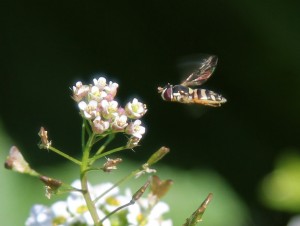Let’s Talk About Insects!
By Lindsey Roberts, Marketing & Communications Director
Lakeside Organic Gardens
The theme at this months Agricultural History Project’s “2nd Saturday on the Farm” is games and grilling. We’re donating some of our favorite grill-able vegetables so the volunteers at AHP can serve them to their guests. They asked if we’d be interested in talking about how these crops are grown. We excitedly said “YES!” and decided to discuss the importance of beneficial insects in our growing practices which make us different from most. Anyways, who doesn’t love talking about insects?
So here goes…
Lakeside Organic Gardens is committed to growing 100% organic produce because we believe it’s the right thing to do. Organic produce is better for our health and our environment. We don’t use synthetic agricultural chemicals but instead we rely on natural fertilizers, compost, beneficial insects, beneficial habitat plants, and strategic crop rotations. Today we’re going to discuss beneficial insects.
We use Mother Nature as often as possible because she will provide us with a lot of control we don’t normally get without using synthetic chemicals. “It’s an expensive way to farm and very time consuming, but well worth it in the end,” said Alan Miyumura, the Disease & Pest Control Manager at Lakeside Organic Gardens.” He goes on to explain “Lakeside releases parasites and lady bugs to aid in managing aphid and other harmful insect populations. Our beneficial insects are encouraged to stay nearby our crops because we plant a beneficial habitat to suits their basic needs.”
Lakeside Organic Gardens will occasionally harvest lady bugs from the Santa Cruz Mountains or purchase beneficial insects and introduce them to a field. Our goal is to create an environment that attracts the adult beneficial insects to the fields. Dick Peixoto, the grower owner says, “the trick is to make our fields look more attractive than the neighbors so they stick around.” The most common beneficial insect in Santa Cruz County is the hover fly, also known as the syrphid fly. It hovers over simple flowers and feeds off the nectar. They look for a nectar abundant place to lay their eggs and once the eggs hatch, the larva feed off the aphid. It’s a win, win situation for an organic farmer.
Our pest control team scans the fields for harmful pests like aphids and worms that do harm to the plants. When harmful pest population gets out of hand, our pest control team decides which beneficial insects to release based on the current pest pressures. If we cannot get the population under control, it’s possible we may plow under an entire field. This is a very tough decision to make and is often a very costly one.
With the help of beneficial insects like hover flies, lady bugs and parasites, we’re able to produce high quality organic vegetables year-round right here in Santa Cruz County on the beautiful Central Coast of California.
“Our belief is that Mother Nature had this figured out long before we arrived, all we have to do is help her as much as we can.” — Dick Peixoto, grower owner



